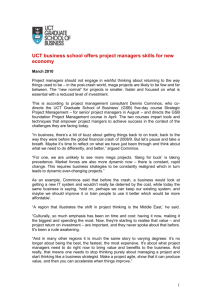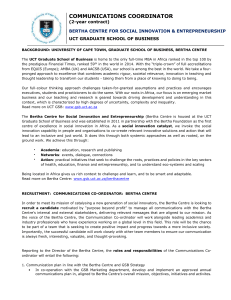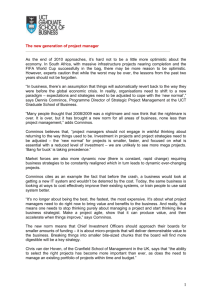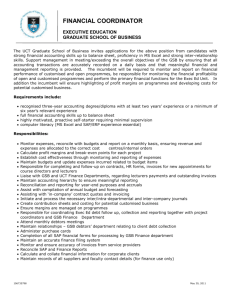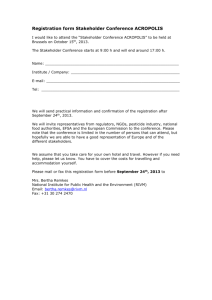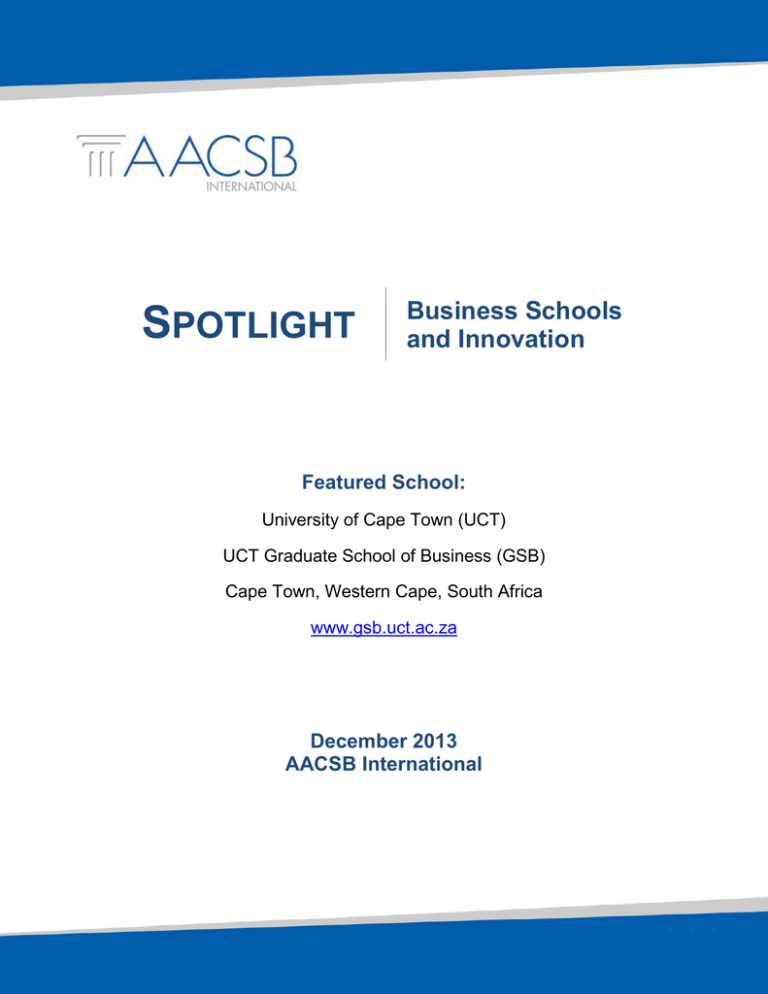
SPOTLIGHT
Business Schools
and Innovation
Featured School:
University of Cape Town (UCT)
UCT Graduate School of Business (GSB)
Cape Town, Western Cape, South Africa
www.gsb.uct.ac.za
December 2013
AACSB International
SPOTLIGHT| Business Schools & Innovation
University of Cape Town GSB|2
The Bertha Centre for Social Innovation and Entrepreneurship
In recent years there has been an undeniable rise in focus on how business schools can and do
contribute to innovation and economic development, especially in the emerging economies around the
world. Particularly in such areas, business schools that choose to bend their efforts to the task of
promoting innovation and entrepreneurship aimed at addressing socio-economic challenges can
demonstrate an impressive impact in combating their society's problems through cultivating leaders with
the ability to draw from a full spectrum of disciplines and cultures to create sustainable, market-based
solutions.
One particularly notable case where a prominent business school has taken up this challenge is at the
Graduate School of Business (GSB) of the University of Cape Town (UCT), in South Africa. According to
Dr. François Bonnici, Founding Director of the Bertha Centre for Social Innovation and Entrepreneurship
(Bertha Centre) at UCT, the GSB had been wanting for some time to open an innovation research center
when he had a serendipitous meeting in 2011 with a representative of the Geneva-based Bertha
1
Foundation, who happened to attend a
public lecture that Dr. Bonnici gave. The
Bertha Foundation is a philanthropic
organization, he says, and a significant
amount of its resources are devoted to
initiatives in South Africa that include
media documentariesto raise awareness
of issues that require change, public
interest legal action, activism in
enterprise, and non-profit (mostly apolitical) advocacy.
The Bertha Foundation wanted to extend its activities to influence the business school’s fundamental
thinking about what is valuable and promote a strong private sector from bottom up for South Africa,
bringing innovation thinking into key social challenges, Dr. Bonnici says. Meanwhile, the GSB was (and
is) well known for its focus on building a new kind of business school: one that is rooted in values and
enabling positive new ways of thinking and acting for a better future on the continent. As a result, the UCT
GSB and the Bertha Foundation found a natural collaborative partnership with one another, and the
Bertha Centre for Social Innovation and Entrepreneurship at UCT was born, becoming "the first of its kind
on the African continent to specialize in social innovation."
2
Bertha Centre Operations
According to Dr. Bonnici, the initial grant from the Bertha Foundation provides five years' worth of funding
to the Centre. However, he says, the Bertha Foundation support has allowed the university to leverage
© AACSB International. All Rights Reserved.
SPOTLIGHT| Business Schools & Innovation
University of Cape Town GSB|3
contributions from other private donors, international research
grants, and the South African national and provincial
governments to expand its operating budget by more than
double the base support from the Foundation, allowing the
Centre to develop a significant number of additional activities.
Because the Centre is almost entirely externally funded, the contributions of the GSB, and of the
university in general, consist primarily of the service of associated faculty and staff collaborating with the
Bertha Centre, and the administrative and research support provided by the university. Dr. Bonnici
indicates that though the Centre is a specialized unit at the GSB, faculty from several other academic
departments at UCT are involved in its initiatives, in addition to several non-academic staff members that
3
provide support for the Bertha Centre's initiatives. The faculty and staff of the Bertha Centre collectively
4
coordinate an impressive list of activities and operations. Dr. Bonnici describes the operations of the
Bertha Centre as falling into at least one of four main categories: Teaching; Research; Policy; and
Initiatives.
Teaching and Student-Facing Initiatives
The Bertha Centre has moved very quickly to develop a robust set of instructional options for students at
UCT GSB. According to Dr. Bonnici, the first teaching initiative established at the Centre was a
5
specialized stream on the MBA in social innovationcalled the Social Innovation (SI) Lab. Students who
wish to pursue this stream can do so in the second half of their MBA program, after completing the core
coursework.
In addition, the Bertha Foundation offers several scholarships to cover full and partial costs of either the
MBA, MPhil or PhD programs at the GSB for African-born candidates committed to social innovation and
6
entrepreneurship. Students in the SI Lab attend a brief overview course to familiarize them with the
concepts they will soon be applying, as well as three two-day symposia, involving expert and practitioner
sessions, with time for students to share and reflect on what they learn.
The primary feature of the SI Lab is a required action-learning oriented course in which students work in
teams of four or five on problems presented by local community organizations or the government or any
social innovation ideas. Dr. Bonnici says that "40 percent of their mark on this course is based on what
they've done, not just on their plan. They need to have an impact. If it's a six-month project, then we
expect them to do quite a bit. We want to see real social change. It's not as simple and clean as putting
together a nice little business plan. Once you get out there and have conversations about change and
test your idea, iterate, and demonstrate, it is all part of the learning journey."
© AACSB International. All Rights Reserved.
SPOTLIGHT| Business Schools & Innovation
University of Cape Town GSB|4
To complete the social innovation stream, students must also undertake at least four SI-focused electives
from eight different available courses. Students completing a standard MBA can still pick however many
they wish, according to Dr. Bonnici. So far, roughly one third of the previous MBA class chose to
7
complete the SI Lab stream, while he says that more than 55 percent of this year's MBA students have
completed at least one of the available electives.
In addition to the SI Lab in the MBA program, the Bertha Centre has also initiated a separate one-year
Master of Philosophy (MPhil) in Inclusive Innovation program.This research-based program allows
students to self-direct with the guidance and support of faculty and staff at UCT GSB, as well as a team of
fellow students, to research and develop inclusive solutions to the challenges present in the African
context, designed to create a better future for Africa.
8
Dr. Bonnici notes that the MPhil was developed to look in a more focused way at the continuum of
innovation; that rather than being concerned about whether something is for commercial or social
purposes, it is addressing challenges to the process that is of primary importance. "This is an evolution of
what the MBA might be," he says.The Bertha Centre is also engaged in working with the GSB to develop
a PhD program with a similar focus.
9
Last but certainly not least, the Centre runs the Student Social Venture Programme (SSVP) in conjunction
with the UCT GSB chapter of theinternational community Net Impact. The SSVP is meant to help develop
and support social ventures in South Africa, as well as promote African teams' success in global social
business plan competitions. The UCT-Reel Gardening team that won SSVP in 2013 succeeded in
winning the regional rounds of the Global Social Venture Competition and the Hult Prize (beating 50 other
universities from Africa, Middle East and Europe) and presented as a finalist of the Hult Prize at the
Clinton Global Initiative in New York in October 2013.
Research, Policy & Publications
Dr. Bonnici says that the Bertha Centre is working with several levels of government in South Africa to
help determine best practices for policy decisions. The provincial government has commissioned a white
paper on strategy for social innovation for the Western Cape. The purpose of this white paper is to help
determine the role of government for social innovation and entrepreneurship. The upcoming white paper
has already received signaturesfrom two government ministers, he notes.
The Bertha Centre has also partnered with the Overseas Development Institute (UK) to help steer a
global research project on the structure of social entrepreneurial ecosystems in developing and emerging
© AACSB International. All Rights Reserved.
SPOTLIGHT| Business Schools & Innovation
University of Cape Town GSB|5
markets, and their engagement with national policy. Inspired by a network perspective and economic
sociological theory of social embeddedness, the analysis seeks to unveil the degree and quality of both
intra- and inter-relatedness among stakeholders of the social entrepreneurial landscape in order to gauge
the intensity, coherence, and shared intention of the ecosystem towards supporting social entrepreneurial
activity.
Another important area of research the Bertha Centre is pursuing is the use of Impact Bonds (also known
10
as Pay-for-Success Instruments), initially piloted by the UK-based not-for-profit Social Finance. Impact
Bondsmake use of risk capital from private investors to pilot social interventions that otherwise may not
be funded. Outcome funders, such as the government, commit to repaying the capital plus returns to the
private investors only if the intervention successfully meets pre-determined outcome and output metrics
(i.e., only if success is achieved).The Bertha Centre is working with stakeholders in Education, Healthcare
and Business Development Services (work funded by the South African National Treasury) to facilitate
the initial stages of pilot construction including initiating stakeholder engagement, defining outcome
metrics, research and analysis of intervention methods and scoping reports.
11
The Bertha Centre's research is disseminated in several self-generated publications. Its longest-running
regular publication is Inside|Out, a quarterly newspaper with both online and print formats.
12
Inside|Out
has served two purposes, notes Dr. Bonnici."It is both a standard newsletter and something more
insightful, focused on trends in social innovation,topics like open learning, bonds, etc. This is quite
practitioner oriented, not too academic. We are trying to reach broader audience," he says.
The collaboration of the Bertha Centre faculty with their colleagues in the Department of Finance and Tax
in UCT's Faculty of Commerce has yielded what expects will be one of the most impactful research
publications of the Centre to date, according to Dr. Bonnici. The South Africa Investing for Impact
Barometer is a new annual publication of the Centre, focused on an audience of finance practitioners. Dr.
Bonnici says the Barometer was first launched by the Bertha Centre in 2013, at a joint conference with
the Rockefeller Foundation and a similar Nigerian foundation, the first pan African conference on the
social impact of financial investment.
13
The Barometer provides a four-page snapshot of the growing market in South Africa for investments that
make apositive social impact. Dr. Bonnici's colleague Dr. Stephanie Giamporcaro, a Senior Lecturer at
the GSB, heads up the Barometer initiative. He says that it is her intention to expand the coverage of the
next edition of the Barometer, to cover four African countries distributed all over the continent (e.g.,
© AACSB International. All Rights Reserved.
SPOTLIGHT| Business Schools & Innovation
University of Cape Town GSB|6
Kenya, Ghana, Nigeria, etc.) in addition to South Africa, with the collaboration of partner business schools
located in those countries.
Initiatives
While measurable impact of its work will come mostly down the line, notes Dr. Bonnici, if the Bertha
Centre is to generate real impacts then its work must have practical application in the field. To this end,
the Centre supports several initiatives devoted to generating innovation and entrepreneurship to solve
social ills.
The project with perhaps the most potential for wide-ranging impact is the development of the Free For All
online learning platform. Free For All is a one-year, modular program in entrepreneurial development
designed for entrepreneurs who own small businesses ranging from one to 50 employees, with at least
five years of relevant experience, who want to complement that experience with an academic
qualification. Modules can be taken in sequence or individually. The seven core modules of the program
use a pedagogical model designed by GSB Director Walter Baets to provide critical entrepreneurial and
management skills, as well as necessary business skills and management perspectives. Currently, over
190 users throughout Africa are enrolled in the program.
14
The Bertha Centre sees this as a green field for social enterprise, according to Dr. Bonnici. "Since it's so
early, we can see how things evolve. It is an interesting ground for research. This will be around building
solutions for the challenges that we face in the country, and getting them to market," he says.
Acknowledgements: AACSB International is grateful for the assistance of Dr. François Bonnici, Director of
the Bertha Centre for Social Innovation and Entrepreneurship at the University of Cape Town Graduate
School of Business, and his staff.
© AACSB International. All Rights Reserved.
SPOTLIGHT| Business Schools & Innovation
University of Cape Town GSB|7
End Notes
1
Bertha Foundation. (2013) Bertha Foundation home webpage. Electronic document,
http://www.berthafoundation.org/, accessed 10/4/13.
2
Chan, Wai Kwen. (2013) "Seed venture flourishes as a growing business." Financial Times, June 10, 2013.
Electronic document, http://www.ft.com/intl/cms/s/2/5d9944ec-c777-11e2-be2700144feab7de.html#axzz2VoaMg5OT, accessed 10/7/13.
3
Bertha Centre for Social Innovation and Entrepreneurship.(2013) People webpage. Electronic document,
http://www.gsb.uct.ac.za/s.asp?p=226, accessed 10/12/13.
4
Bertha Centre for Social Innovation and Entrepreneurship.(2013) Overview webpage. Electronic document,
http://www.gsb.uct.ac.za/s.asp?p=389, accessed 10/7/13.
5
Bertha Centre for Social Innovation and Entrepreneurship.(2013) Social Innovation Lab webpage. Electronic
document, http://www.gsb.uct.ac.za/s.asp?p=178, accessed 10/14/13.
6
Bertha Centre for Social Innovation and Entrepreneurship.(2013) Scholarships webpage. Electronic document,
http://www.gsb.uct.ac.za/s.asp?p=179, accessed 10/22/13.
7
GSE Research, Ltd. (2012) Inspirational Guide for the Implementation of PRME: Placing Sustainability at the Heart
of Management Education. GSE Research, Limited. Electronic document,
http://www.gseresearch.com/uploads/files/pdf/prme/FINAL_COMPLETE.pdf, p. 110; accessed 10/21/13.
8
University of Cape Town Graduate School of Business.(2013) Inclusive Innovation Studies webpage. Electronic
document, http://www.gsb.uct.ac.za/s.asp?p=48, accessed 10/21/13.
9
Bertha Centre for Social Innovation and Entrepreneurship.(2013) PhD webpage. Electronic document,
http://www.gsb.uct.ac.za/s.asp?p=492, accessed 10/24/13.
10
Social Finance. (2013) Social Finance Home page. Electronic document, http://www.socialfinance.org.uk/,
accessed 11/15/13.
11
Bertha Centre for Social Innovation and Entrepreneurship.(2013) Innovative Financing webpage. Electronic
document, http, accessed 11/15/13.
12
Bertha Centre for Social Innovation and Entrepreneurship. (2013) Inside|Out Social Innovation Paper web page.
Electronic document, http://www.gsb.uct.ac.za/s.asp?p=493, accessed 11/15/13.
13
Bertha Centre for Social Innovation and Entrepreneurship. (2013) Investing for Impact Barometer webpage.
Electronic document, http://www.gsb.uct.ac.za/s.asp?p=499, accessed 10/24/13.
14
Bertha Centre for Social Innovation and Entrepreneurship.(2013) Free For All Online Learning Platform webpage.
Electronic document, http://www.gsb.uct.ac.za/s.asp?p=489, accessed 11/18/13.
© AACSB International. All Rights Reserved.

